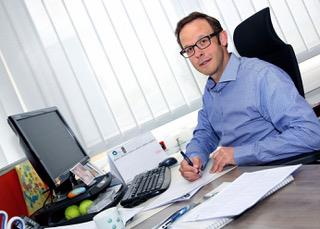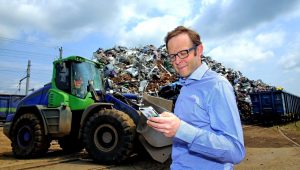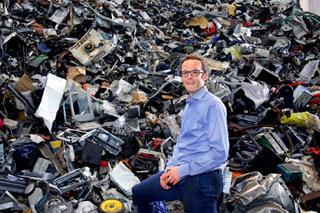 Dietmar Berger is responsible for the commercial side of Metall Recycling Mü-Gu and Metran Handel. In this interview, he talks about the fast-changing world, his personal trust and his current and future plans.
Dietmar Berger is responsible for the commercial side of Metall Recycling Mü-Gu and Metran Handel. In this interview, he talks about the fast-changing world, his personal trust and his current and future plans.
Mr. Berger, the commercial activities of purchasing and sales are important in every company. How are you dealing with these commercial activities?
DIETMAR BERGER: For our company, the sourcing activities are of crucial importance in order to finally be able to sell the corresponding quantities of secondary raw materials at the end of the recycling processes. For this reason our team of 5 purchasers is constantly on the road both in Austria and abroad. With our suppliers we negotiate the sourcing prices and quantities directly and on the spot. For our sourcing team, it is particularly exciting that they are purchasing for two companies of the Müller-Guttenbrunn Group – namely for Metall Recycling Mü-Gu and for Metran at the same time. That is also why I am working very closely with Martin Kriegl, Managing Director of Metran Handel. Basically we see ourselves as one entity and also act as such – hence our activities can be seen as one commercial network for two separate companies.
Does this mean that the personal contacts play an important role?
 DIETMAR BERGER: Exactly. The direct contact with our suppliers and customers is what we cultivate and live every day. This means not only a lot of travelling, but also making many phone calls and writing many personal e-mails. Nowadays everybody expects an immediate answer. If we cannot be reached right away, our competition is contacted immediately instead. Everything has really become very fast. This is probably due to the fact that metals are traded at stock exchange prices. And these prices can sometimes change within a few minutes.
DIETMAR BERGER: Exactly. The direct contact with our suppliers and customers is what we cultivate and live every day. This means not only a lot of travelling, but also making many phone calls and writing many personal e-mails. Nowadays everybody expects an immediate answer. If we cannot be reached right away, our competition is contacted immediately instead. Everything has really become very fast. This is probably due to the fact that metals are traded at stock exchange prices. And these prices can sometimes change within a few minutes.
But you cannot do everything personally, can you?
DIETMAR BERGER: In our daily business, much is agreed by the phone. Much is based upon on trust. But you have to realize that such a relationship of trust can only be built up over a long time, sometimes even years. That is why I did a lot of field work, when I joined the management team back in December 2009. As a result of all these personal contacts and meetings with the majority of our partners, we now know exactly with whom we can do business just by picking up the telephone.
You have previously worked in the sales of Mastercard credit cards of Europay. How difficult was the changeover when you came to Amstetten in 2007?
DIETMAR BERGER: This is, of course, a completely different kind of business. But I was fortunate enough to learn a lot from my colleague Michael Grimm, who was responsible for the commercial activities at that time. Still today I can ask him about peculiarities about certain businesses. At the beginning I also answered calls from our weighing bridge and took over material from suppliers directly at the scrap yard. Often we immediately haggled for the price at the same time. This was definitely a good learning school.
You have emphasized the word „team“ several times. How does the team coordinate internally?
DIETMAR BERGER: There is a sourcing meeting every week. The entire field service team reports about their market impressions. This meeting has an important impact as interface between purchasing and sales activities. Since there are often clear differences in individual markets, these reports are always interesting to follow. To our extended commercial team we also count our subsidiaries abroad. Therefore, we also work closely with them by exchanging ourselves on a regular basis.
With so many contacts, both in Austria and abroad, you are probably not always sitting at your desk, right?
DIETMAR BERGER: Well, I would say that some 30 per cent of my working time is spent on the road.
You have mentioned the often rapidly changing prices before. Is it possible to conclude long-term contracts at all?
DIETMAR BERGER: The approaches can be quite different. Most of our contracts are rather short-term contracts. We often work based upon experience when it comes to pricing. Nevertheless, there are also quarterly contracts and rarely – but nevertheless – there are also annual contracts. Speculation has nothing to do in our daily business! Unfortunately, we recognize that there is also a trend by others to simply send out e-mails with pricing proposals. This kind of price battle is not our style of business. We rely on long-term relations with personal contacts. And this way we have developed real friendships over the many years.
How is this strategy working out?
 DIETMAR BERGER: The first quarter of 2017 went well. With our technicians in the Müller-Guttenbrunn Group, we are currently trying to expand our portfolio in the field of rigid plastics. Our goal is to establish a recycling of rigid mixed plastic from a separate collection in Lower Austria. These rigid plastics today are being incinerated, but now we have the technology to separate and recycle these rigid plastics. We have to dig into opportunities like these. As a large WEEE recycler we have an excellent positioning in the markets that we service. We are not any longer to be seen as a classic scrap dealer, operating at the end of a linear chain. On the contrary we see the Müller-Guttenbrunn Group completely different and we have taken the opposite route. We see ourselves at the beginning of the circular economy of raw materials. This is a crucial difference in a European market that is low in the availability of natural resources.
DIETMAR BERGER: The first quarter of 2017 went well. With our technicians in the Müller-Guttenbrunn Group, we are currently trying to expand our portfolio in the field of rigid plastics. Our goal is to establish a recycling of rigid mixed plastic from a separate collection in Lower Austria. These rigid plastics today are being incinerated, but now we have the technology to separate and recycle these rigid plastics. We have to dig into opportunities like these. As a large WEEE recycler we have an excellent positioning in the markets that we service. We are not any longer to be seen as a classic scrap dealer, operating at the end of a linear chain. On the contrary we see the Müller-Guttenbrunn Group completely different and we have taken the opposite route. We see ourselves at the beginning of the circular economy of raw materials. This is a crucial difference in a European market that is low in the availability of natural resources.
Behind this, there is a lot of personal commitment from all employees in the Müller-Guttenbrunn Group. What makes the difference?
DIETMAR BERGER: The great thing is that the Müller-Guttenbrunn Group has remained to be a family business. This means that we have very short distances. This makes decisions easy and uncomplicated and this gives us a clear competitive advantage. It also motivates our employees to think out of the box and to take responsibility to propose innovations. Each of us can move something here and that is the beauty of working in the Müller-Guttenbrunn Group.





